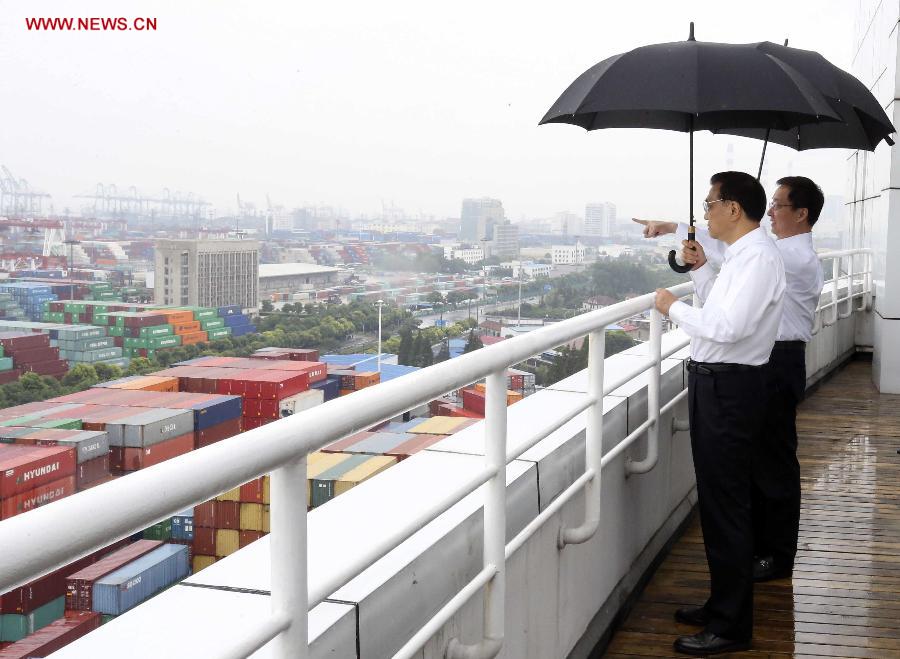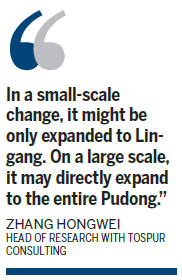|
 Chinese Premier Li Keqiang (L) visits the Waigaoqiao logistics center of the China (Shanghai) Pilot Free Trade Zone (FTZ), East China's Shanghai, Sept 19, 2014. Li Keqiang made an inspection tour of the FTZ from Sept 18 to 19. [Photo/Xinhua]
|
Companies could include facilities in nearby areas within scope of reforms
Premier Li Keqiang wrapped up a two-day visit to the China (Shanghai) Pilot Free Trade Zone on Friday with a promise that companies registered in the zone will get more flexibility to expand beyond the boundaries of the FTZ while still functioning under the umbrella of the zone's pilot status.
Experts said his comments indicated that the 28-sq-km area will become a concept as well as a specific location.
 Companies in the zone will be able to include facilities in areas that surround it within the scope of what are considered China's boldest reforms in decades, including the liberalization of the yuan and market-driven interest rates.
Companies in the zone will be able to include facilities in areas that surround it within the scope of what are considered China's boldest reforms in decades, including the liberalization of the yuan and market-driven interest rates.
The actual FTZ is too small for developing large projects that require a lot of land, such as ports, logistics centers and hospitals. Companies registered in the FTZ should be allowed to establish factories in surrounding areas, Li said, after hearing reports on the FTZ's development.
As reforms in the FTZ cannot yet be replicated elsewhere, the pilot zone's scope should initially be expanded to adjacent areas, Li said.
Li made the remarks after a fact-finding trip to a logistics center in Waigaoqiao, the largest of the four sectors of the Shanghai FTZ.
While approving innovative management moves to cut red tape and facilitate customs clearance, the premier expressed concern over the lack of space at the port.
Shanghai is the leading city on the "golden" Yangtze waterway, so Shanghai's prosperity could accelerate the development of the entire Yangtze River economic belt, Li said.
However, "containers here have already piled up for eight layers and there is no room left. How do you plan to push forward further development?" Li asked the management of Waigaoqiao port.
Experts said Li's remarks sent a clear signal for the expansion of the Shanghai FTZ.
Chen Bo, secretary-general of the FTZ Institute at the Shanghai University of Finance and Economics, said: "More land for the FTZ has always been the expectation of Shanghai."
Chen said that ever since the FTZ was approved by the central government in August 2013, the authorities in Shanghai have been pushing to include the 100-sq-km Lingang New City in southeast Shanghai in the pilot zone.
The moving of the FTZ management committee from Waigaoqiao to Lingang in March brought that goal a step closer.
Under an early plan, even Shanghai Disneyland Park and the Jinqiao Export and Processing Zone were considered for inclusion in the expanded FTZ, according to Chen.
"But there are still risks in some of the reform measures, and if the area is too large, reform will lose its focus," Chen said.
Since the FTZ opened a year ago, surging land prices and office rents have troubled many of the companies registered within the zone.
According to a report by Dooioo Property, real estate prices in the FTZ have increased nearly 20 percent year-on-year amid an overall cooling market nationwide. The average housing price in Waigaoqiao has exceeded 40,000 yuan ($6,516) per sq m, a level equivalent to downtown Shanghai.
The FTZ expansion will mainly benefit logistics companies, hospitals and schools, Chen said. He noted that manufacturers may not be very interested because land prices will still be much higher than outside.
But whether the zone actually expands will depend on the first-year evaluation of the FTZ, Chen said. "If the results turn out to be bad, and that's not because of inadequate land supply, the central government would be reluctant to do so."
But the official attitude is positive overall at the moment, he said.
Zhang Hongwei, head of research with Tospur Consulting, said the expansion of the Shanghai FTZ is an inevitable development trend in terms of the government's plan.
"In a small-scale change, it might be only expanded to Lingang. On a large scale, it may directly expand to the entire Pudong region."